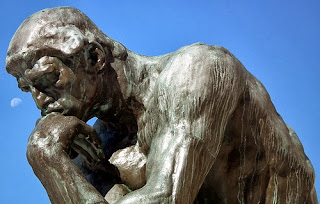Predestination: Yes, God Does Keep Some Secrets from Us
Let’s continue our blog series
on Paradise Lost by looking at Books
7 and 8.
Summary
Book 7:
Raphael recounts how God created the world, in what amounts
to Genesis 1 in poetry form.
Book 8:
Adam shares the story of his first few moments of life.
Meditation
On a couple occasions, Adam asks Raphael for more information
about creation. His curiosity is completely innocent, and Raphael answers
willingly enough, but with the caveat that some of God’s ways are beyond human
comprehension. God will never withhold knowledge that will make us happier (7,
line 117), but because God alone is omniscient, some of His truths are
“suppressed in night” (line 123).
…heaven is for thee too high
To know what passes there; be lowly
wise (8, lines 172-173)
We may not like to hear it, but God does keep some cards
close to His chest. “The secret things belong to the LORD our God, but those
things which are revealed belong to us and to our children forever, that we may
do all the words of this law” (Deut. 29:29).
One of the “secret things” that belong to the Lord is the
doctrine of election, more popularly called predestination. Yes, the Bible
talks about election. To ignore it is to skirt the edges of the ignorance we denounced in our last Paradise
Lost post. Proponents of free will are in danger of this error. (It’s an
error I committed frequently. When I didn’t believe in election, I simply pretended
Romans 9 didn’t exist; I willingly denied truth that was readily available to
me.)
At the same time, advocates of predestination—and especially
those who call themselves Calvinists—need to be careful not to try figuring out
exactly how election works. We mustn’t rely too heavily on human logic to make
sense of the mystery of predestination. We may end up explaining how certain
verses don’t really mean what they say—and that isn’t humble hermeneutics.
Martin Luther warns us that “what
is above us is none of our concern. For thoughts of this kind, which
investigate something more sublime above or outside the revelation of God, are
altogether hellish.”
Unlike Luther, John Wesley was an advocate of free will, yet he agreed
on our need for humility in mining the depths of God’s wisdom. Commenting on
Deuteronomy 29:29, he says that the ways of God “are often times hidden from
us, unsearchable by our shallow capacities, and matters for our admiration, not
our enquiry.” When we are “lowly wise,” we humbly and willingly accept our
limitations in the face of God’s omniscience.
There is definitely room for debating Biblical doctrines, even weighty
ones. There are many mysteries that God has revealed, either in full or in part.
But where mystery remains, let us not pretend to know what God has not taught.
How do we know when we are being lowly wise? When we step into the
waters of God’s mysterious providence and, instead of complaining about getting
wet, we admire the unsearchable wisdom of God that is “past finding out” (Rom.
11:33). We know we are being lowly wise when we can say along with King David,
“LORD, my heart is not haughty, nor my eyes
lofty. Neither do I concern myself with great matters, nor with things too
profound for me” (Ps. 131:1).
Far from making Him cold and
distant, God’s omniscience comforts me with the promise that His knowledge is infinite.
Therefore, He can be trusted with all my cares, longings, and needs, for He is
both aware of them all and aware of what is truly best for me.
So let us praise God for what He
has revealed, and let us admire Him for the knowledge He has kept secret. We
may not know all His mysterious ways, but we do know His heart, and it is a
heart that lavishes unending grace on undeserving and repentant hearts.
Knowledge of this amazing love is more than enough.
